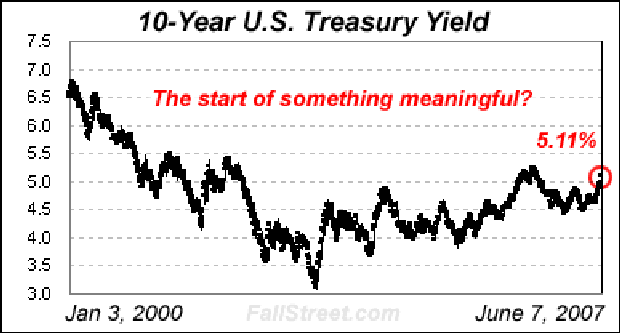US Interest Rates Conundrum Unwind or Glut Rewind?
Interest-Rates / US Interest Rates Jun 08, 2007 - 10:53 AM GMTBy: Brady_Willett
 The U.S. economy slowed to a crawl in 1Q07 and the U.S. housing market is, by many accounts, years away from a meaningful rebound. With this in mind, why are long-term U.S. interest rates spiking higher and why have mortgage rates risen in each of the last four weeks to rest at 10-month highs?
The U.S. economy slowed to a crawl in 1Q07 and the U.S. housing market is, by many accounts, years away from a meaningful rebound. With this in mind, why are long-term U.S. interest rates spiking higher and why have mortgage rates risen in each of the last four weeks to rest at 10-month highs?
Before trying to answer the above questions it should be noted that while market movements can be easily (not necessarily correctly) validated after the fact, seldom are such short-term movements fully understood/forecasted beforehand. For example, Greenspan previously noted that falling long-term interest rates in the face of Fed rate hikes was a ‘conundrum', adding “it will be some time before we are able to better judge the forces underlying recent experience”. More than two years later and Greenspan's ‘conundrum' observations still resonate, suggesting that it indeed takes ‘time' for some markets to be clearly understood.
“I am not convinced that we are in a cyclical bear market [in U.S. Government Bonds]. It's the normalization of interest rates. I would call it the unwinding of the Greenspan conundrum.” David Rosenberg, Merrill
“…after 25 years of being a bull market manager to all of a sudden become a bear market manager…is sort of a major shift.” Bill Gross, PIMCO

Did Bernanke Solve The Riddle?
Bernanke wasted little time tackling Greenspan's ‘conundrum' back in 2005, memorably noting :
“…over the past decade a combination of diverse forces has created a significant increase in the global supply of saving-- a global saving glut --which helps to explain both the increase in the U.S. current account deficit and the relatively low level of long-term real interest rates in the world today.” (bold added)
Usually limited to U.S. current account deficit/interest rate debates, Bernanke's ‘glut' speech is also useful when discussing asset prices. Specifically, Bernanke's notes on the U.S. housing market - which were made before the market entered its final mania phase - are worthy of recap today:
“The weakening of new capital investment after the drop in equity prices did not much change the net effect of the global saving glut on the U.S. current account. The transmission mechanism changed, however, as low real interest rates rather than high stock prices became a principal cause of lower U.S. saving. In particular, during the past few years, the key asset-price effects of the global saving glut appear to have occurred in the market for residential investment ...This increased supply of saving boosted U.S. equity values during the period of the stock market boom and helped to increase U.S. home values during the more recent period”
With capital shying away from real estate and charging [back] into equities as well as other areas (i.e. commodities, emerging markets, junk bonds, etc.), these dated words from Bernanke can be simplified into the following today: a glut of money is chasing nearly all asset classes. At the risk of suggesting that a permanent and peaceful glut in investment capital now exists, it should be remembered that debt creation, greater financial leverage, and declining absolute investment yields are the result of this ‘increased [money] supply'.
Getting Back To The Questions At Hand
With the ‘glut' of money that is playing musical chairs with global asset prices convinced the music will never stop, asset price inflation continues largely unabated. Combine this with strong global economic growth and the specter of an unwelcome rise in traditional inflation ary pressures arises. Apparently wait-and-see central bankers - which have recently adopted a more aggressive anti-inflationary stance - believed that a U.S. led slowdown and/or asset price fallout would curtail inflationary forces. They were wrong, and - slow U.S. economic growth or not - are now faced with the dangerous idea of having to raise interest rates further ( or threatening to raise interest rates ) to combat inflation.
As for rising U.S. mortgage rates, banks (and/or whoever wishes to lend money these days) need to borrow money before they lend it. Although intimately impacted by interest rates, the dismal state of the U.S. housing market alone can not stop ominous curve demons from flaring up.
In summary, with U.S. economic growth slowing to a crawl and the U.S. housing market threatening to curtail any rebound attempt, it is doubtful that U.S. interest rates have embarked upon a sustained rise from current levels. Translation: the bond bear party that started in recent sessions will likely meet an abrupt end (save a run out the dollar).
As for whether or not recent events mark the beginning of a ‘bond bear' or simply the unwind of Greenspan's ‘conundrum', remember that seldom are market movements fully understood/forecasted beforehand. The only real conundrum is why so many market participants do not believe that recessions and bear markets are the inevitable result of fiat glut gambles gone wrong.
By Brady Willett
FallStreet.com
FallStreet.com was launched in January of 2000 with the mandate of providing an alternative opinion on the U.S. equity markets. In the context of an uncritical herd euphoria that characterizes the mainstream media, Fallstreet strives to provide investors with the information they need to make informed investment decisions. To that end, we provide a clearinghouse for bearish and value-oriented investment information, independent research, and an investment newsletter containing specific company selections.
© 2005-2022 http://www.MarketOracle.co.uk - The Market Oracle is a FREE Daily Financial Markets Analysis & Forecasting online publication.


